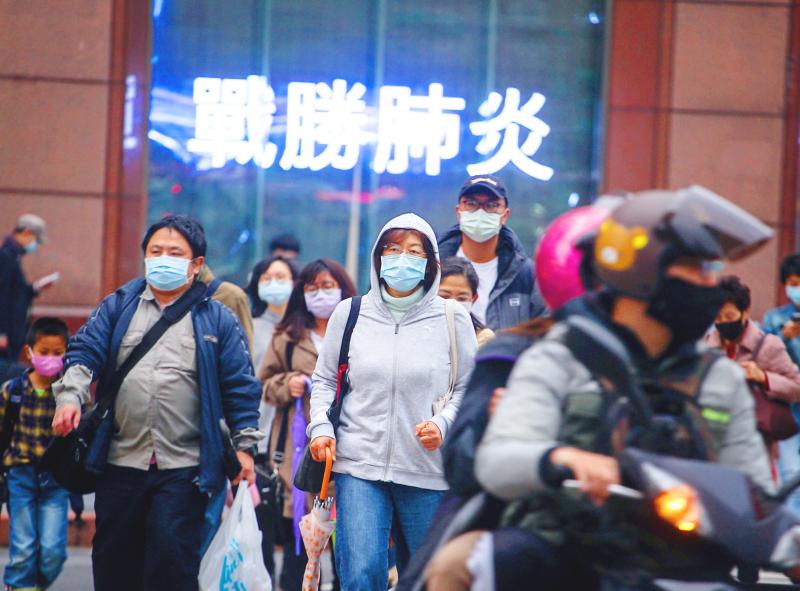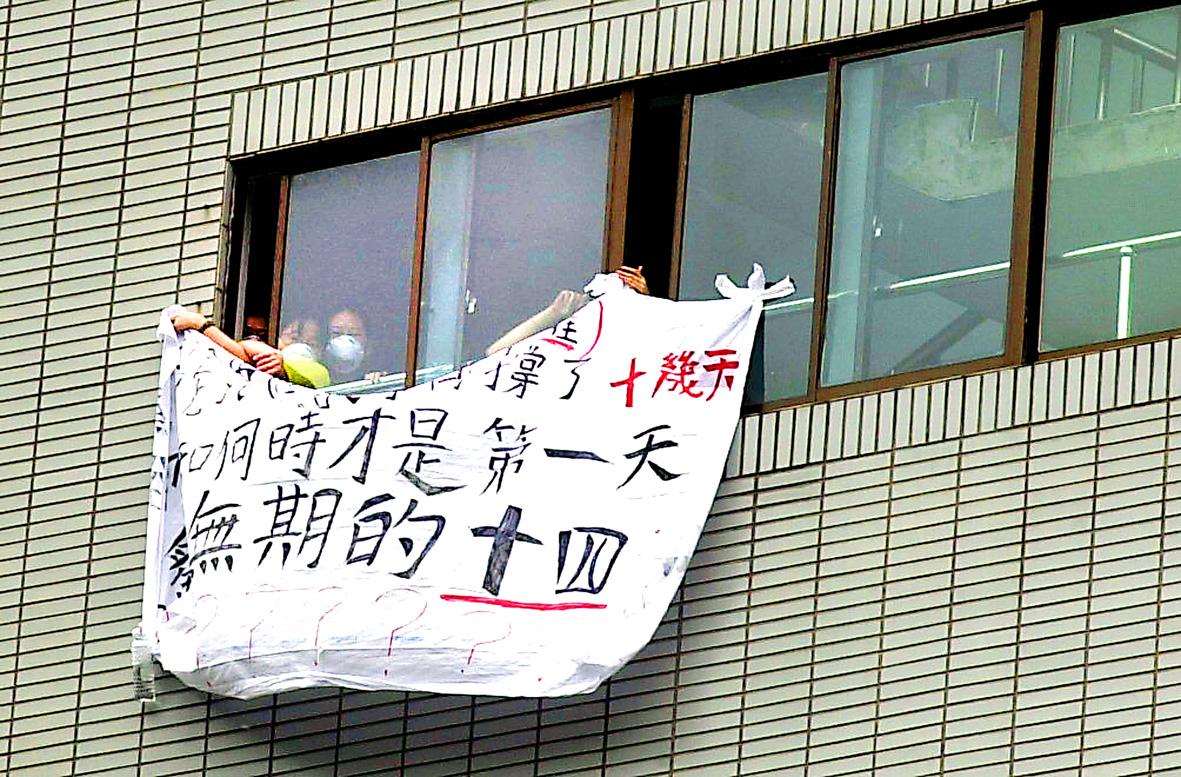President Tsai Ing-wen (蔡英文) and Vice President Chen Chien-jen (陳建仁) yesterday called for unity in the fight against COVID-19 as they reflected on a lockdown at Taipei City Hospital’s Heping branch during the SARS outbreak 17 years ago.
“On April 24, 2003, the Heping branch announced a lockdown without supplementary measures. Thousands of medical personnel, patients and their families suddenly found themselves forcibly confined in the hospital,” Tsai wrote on Facebook in Chinese.
Taiwanese, having experienced the SARS outbreak, must still remember the panic when the epidemic spiraled out of control, she said.

Photo: CNA
She thanked all medical personnel for protecting Taiwanese by working on the front lines when the nation is threatened by a new disease, and called for unity among the central and local governments, as well as the public, in the battle against COVID-19.
Chen, who as the then-minister of health helped curb the spread of SARS, on Facebook also reviewed the nation’s pain and advances following the outbreak.
During the Heping branch’s two-week lockdown, 57 employees were infected, including seven fatalities, while 97 members of the public were infected and 24 died, including one suicide, he said, describing the SARS outbreak as another “centennial catastrophe” for Taiwan following the 921 Earthquake in 1999.

Photo: Chu Pei-hsiung, Taipei Times
He summarized his 2003 report on the nation’s response to SARS.
The outbreak exposed the national medical system’s problems at that time, including a lopsided emphasis on treatment over public healthcare, inadequate training of medical personnel on responding to infectious diseases and stiff regulations for controlling communicable diseases, as well as a lack of emergency response plans, and public education about health and disease prevention, Chen wrote.
More critically, the central and local governments failed to communicate effectively, leaving them unable to fight the disease through concerted efforts, he wrote.
Since the “Wuhan pneumonia” broke out four months ago, central and local governments across party lines have united for disease prevention under the guidance of the Central Epidemic Command Center (CECC), with Taiwan’s achievements praised by the world, he added.
Chen called for “more expertise and less politics” to maintain the hard-won achievements.
Asked to comment on the anniversary at the center’s news briefing yesterday, CECC advisory specialist panel convener Chang Shan-chwen (張上淳) said he had mixed feelings.
Chang, who was National Taiwan University Hospital’s infectious disease control group convener during the SARS outbreak, said that he visited the hospital on Thursday for the second time during the COVID-19 pandemic and was glad to see that its medical personnel were in high spirits.
Since the SARS outbreak, the Heping branch has become better prepared to handle infectious diseases, Chang said, adding that public disease education has improved, as evidenced by nearby stores operating normally without showing signs of panic.
Minister of Health and Welfare Chen Shih-chung (陳時中), who heads the center, called for more empathy and understanding for patients, and those placed under home isolation or quarantine.
No one wants to be infected and “witch hunts” should be avoided when tackling a disease, he said.
Regarding Kaohsiung Mayor Han Kuo-yu’s (韓國瑜) plan to have all of the city’s medical personnel tested for the novel coronavirus, Chen Shih-chung expressed doubt about its necessity.
The center has arranged for testing of 1,852 medical personnel, none of whom have tested positive, he said, questioning whether it is necessary to test a wider range of health workers.
Medical resources should be effectively distributed based on scientific evaluations, in case they are needed for emergencies, he said, adding that government testing resources would only be used on those who need them.
Separately yesterday, Taichung Mayor Lu Shiow-yen (盧秀燕) rejected claims that the city would be in lockdown during a drill today for enhanced disease prevention controls, saying that the lives of residents would not be affected.
Additional reporting by Huang Chung-shan

Right-wing political scientist Laura Fernandez on Sunday won Costa Rica’s presidential election by a landslide, after promising to crack down on rising violence linked to the cocaine trade. Fernandez’s nearest rival, economist Alvaro Ramos, conceded defeat as results showed the ruling party far exceeding the threshold of 40 percent needed to avoid a runoff. With 94 percent of polling stations counted, the political heir of outgoing Costa Rican President Rodrigo Chaves had captured 48.3 percent of the vote compared with Ramos’ 33.4 percent, the Supreme Electoral Tribunal said. As soon as the first results were announced, members of Fernandez’s Sovereign People’s Party

MORE RESPONSIBILITY: Draftees would be expected to fight alongside professional soldiers, likely requiring the transformation of some training brigades into combat units The armed forces are to start incorporating new conscripts into combined arms brigades this year to enhance combat readiness, the Executive Yuan’s latest policy report said. The new policy would affect Taiwanese men entering the military for their compulsory service, which was extended to one year under reforms by then-president Tsai Ing-wen (蔡英文) in 2022. The conscripts would be trained to operate machine guns, uncrewed aerial vehicles, anti-tank guided missile launchers and Stinger air defense systems, the report said, adding that the basic training would be lengthened to eight weeks. After basic training, conscripts would be sorted into infantry battalions that would take

GROWING AMBITIONS: The scale and tempo of the operations show that the Strait has become the core theater for China to expand its security interests, the report said Chinese military aircraft incursions around Taiwan have surged nearly 15-fold over the past five years, according to a report released yesterday by the Democratic Progressive Party’s (DPP) Department of China Affairs. Sorties in the Taiwan Strait were previously irregular, totaling 380 in 2020, but have since evolved into routine operations, the report showed. “This demonstrates that the Taiwan Strait has become both the starting point and testing ground for Beijing’s expansionist ambitions,” it said. Driven by military expansionism, China is systematically pursuing actions aimed at altering the regional “status quo,” the department said, adding that Taiwan represents the most critical link in China’s

‘REALLY PROUD’: Nvidia would not be possible without Taiwan, Huang said, adding that TSMC would be increasing its capacity by 100 percent Nvidia Corp CEO Jensen Huang (黃仁勳) on Saturday praised and lightly cajoled his major Taiwanese suppliers to produce more to help power strong demand for artificial intelligence (AI), capping a visit to the country of his birth, where he has been mobbed by adoring fans at every step. Speaking at an impromptu press conference in the rain outside a Taipei restaurant, where he had hosted suppliers for a “trillion-dollar dinner,” named after the market capitalization of those firms attending, Huang said this would be another good year for business. “TSMC needs to work very hard this year because I need a lot